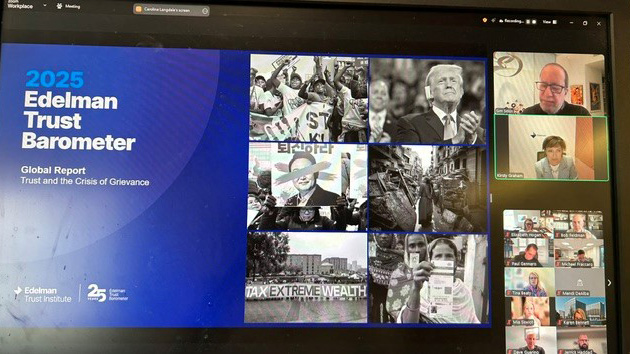Post by Page member Bob Feldman, originally appearing on The Dialogue Project at Duke.
The Civility Call provides a vital forum for senior HR and communications leaders to share best practices on managing workplace tensions during polarized times. Convened in partnership with SHRM and the Page Society, these monthly discussions provide expert insights and best practices from participants’ organizations. Each month, executives engage in candid dialogue after expert-led discussions on pressing topics like navigating political discourse, customer relationships across divides, and supporting employee wellbeing. This open sharing of strategies and experiences is critical, as businesses face escalating civility risks that can disrupt operations and damage reputations.
As polarization continues to impact organizations, more than 50 senior executives gathered virtually for the March session of The Civility Call to explore one of polarization’s most troubling consequences: the erosion of trust across institutions and workplaces.
The Civility Call series focuses on how business can help reduce polarization and improve civil discourse; it is produced by the Dialogue Project, housed at the Fuqua School of Business at Duke University, in collaboration with SHRM and the Page Society.
“A polarized population means a polarized workforce, and virtually every company has confronted the challenges of dealing with employees on a wide range of business and social issues,” said Bob Feldman, founder of the Dialogue Project. “These Civility Calls gather senior human resource and communications executives to share insights and offer actionable ideas.”
The March session featured Kirsty Graham, U.S. CEO of Edelman, who shared findings from the 2025 Edelman Trust Barometer, alongside insights from Paul Gennaro, Chief Communications Officer at New York Life Insurance Company, and Michael Fraccaro, Chief People Officer at Mastercard. Duke Professor Sim Sitkin, a nationally recognized expert on leadership and trust, moderated the discussion.
Setting the context with fresh SHRM research, Chief Brand & Marketing Officer Tina Beaty revealed how workplace instability connects to specific business decisions: “Workers at companies with layoffs or mass terminations engage in 1.5 uncivil acts at work per month, compared to just under one if your company has not engaged in layoffs,” she noted. Similarly, return-to-office mandates increased uncivil behaviors by over 60 percent.

Edelman’s 2025 Trust Barometer revealed political polarization and deepening fears giving rise to a widespread sense of grievance. The panel, along with audience members, discussed the implications of those findings and what businesses can do to lessen the problem.
Graham presented Edelman’s findings from the firm’s 25th annual Trust Barometer, highlighting a troubling 13-point gap in trust between high and low-income earners — with the largest disparity (16 points) in trust toward business.
“Low-income individuals are not likely to trust any institution,” Graham explained. “There’s a concerning finding that people believe societal leaders are purposely misleading them by saying things they know to be false or exaggerating.”
The research revealed four in ten people see “hostile activism” as a viable means to drive change, including attacking people online, spreading disinformation, or damaging property. That number is even higher among young adults, with over 50 percent of people between the ages of 18 and 34 approving of such tactics.
This deteriorating trust landscape has significant implications for business leaders. According to the research, CEOs face a 34-point trust deficit among people with high grievance, compared to those with low grievance levels.
“The sense of grievance grows when people don’t think they can get ahead economically,” Graham explained.
Professor Sitkin framed trust as being built on three foundational elements: capability, benevolence, and integrity. His research has identified additional critical factors: “Do you convey that you truly understand them? Do you respect them? And are you going to treat them fairly? If you don’t understand and respond to their distinct needs, they won’t trust you. But when you do adapt to differing needs you also need to explain why responding to differences does not represent inconsistency but instead is a consistent reflection of core underlying values that drive the leader and organization.”
Panelists shared how their organizations are working to strengthen these trust components. Fraccaro described Mastercard’s focus on both the “outer game” of business performance and the “inner game” of leadership development.
“We talk about the decency quotient — having your hand on people’s back, not in their face in times of crisis,” he explained. “That is not just a tagline, it’s embedded in everything that we do, including our performance management system.”
At New York Life, Gennaro emphasized the importance of leveraging the current advantage business holds: “If this had been 2009-2010, trust in business would be low. But we’re now at a point where employees and the public trust business more than government or media. That’s a trust we need to safeguard.”
His approach centers on three key elements: “It comes down to leading with empathy, listening with precision, and communication that is candid, transparent, and most importantly, consistent.”
The panelists outlined several actionable strategies for rebuilding trust:
The session emphasized that rebuilding trust isn’t a short-term proposition. As Graham noted, “Trust is one of those things that you amass in drops and lose in bucket loads.”
Nevertheless, as organizations navigate these challenges, they have an opportunity to lead in rebuilding social cohesion. The next Civility Call on April 28th will continue exploring pathways for business to foster civil discourse in an increasingly polarized world.